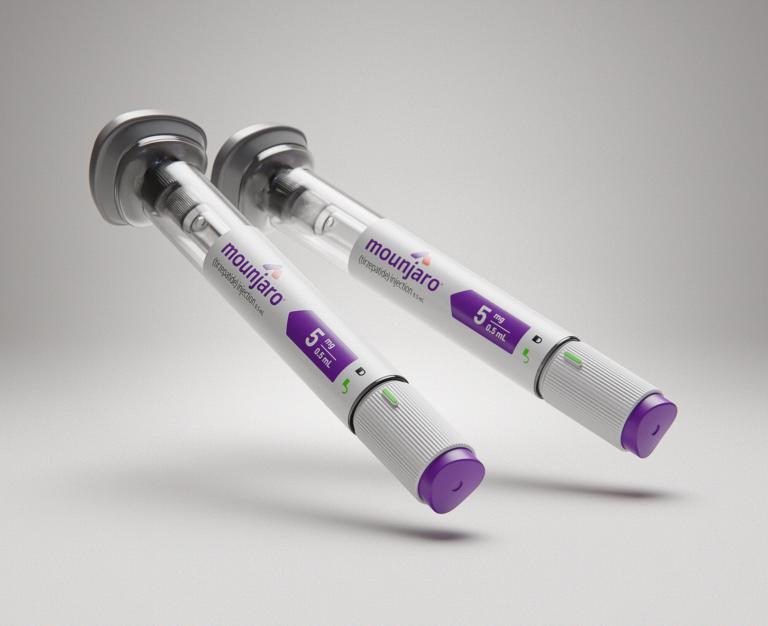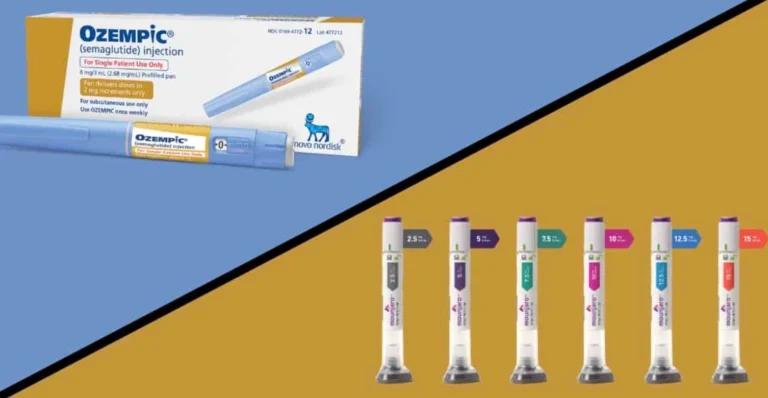
September 17, 2025 (Current Version)
March 28, 2025
Diabetes management and maintaining healthy blood sugar levels is crucial for individuals with type 2 diabetes. In recent years, two diabetes medications, Mounjaro and Ozempic, have gained attention for their effectiveness in not only controlling blood sugar levels, but also promoting weight loss. While they have similarities in their mechanisms of action and side effects, each medication has unique characteristics that set them apart. In this comprehensive guide, we will compare Mounjaro and Ozempic, exploring their uses, efficacy, side effects, and potential off-label use.
Understanding the active ingredients: Semaglutide vs. Tirzepatide
One of the key differences between Mounjaro and Ozempic lies in their active ingredients. Brand name drug Ozempic contains the active ingredient semaglutide, while Mounjaro contains tirzepatide.
Mounjaro is the first and only approved once-weekly GIP (glucose-dependent insulinotropic polypeptide) and GLP-1 (glucagon-like peptide-1) receptor agonist. It is a single molecule that targets the body’s receptors for GIP and GLP-1, which are natural incretin hormones.
On the other hand, semaglutide is a GLP-1 agonist (glucagon-like peptide-1) only, which mimics the effects of the GLP-1 hormone in the body.
GLP-1 hormones play a crucial role in regulating blood sugar levels, insulin secretion, and appetite. By mimicking GLP-1 hormones, both semaglutide and tirzepatide help improve blood sugar control and promote weight loss. However, tirzepatide’s additional action on GIP hormones enhances its ability to regulate appetite and improve satiety, potentially leading to greater weight loss compared to semaglutide.
Mounjaro is manufactured by Eli Lilly, whereas Novo Nordisk manufactures Ozempic.
Approved uses and off-label benefits
Ozempic is U.S. Food and Drug Administration-approved (FDA-approved) for the treatment of type 2 diabetes and has an additional indication for reducing the risk of major cardiovascular events, such as heart attack or stroke in individuals with type 2 diabetes and cardiovascular disease. Mounjaro, on the other hand, received FDA approval in 2022 solely for the treatment of type 2 diabetes. However, both medications have shown potential for off-label use in weight loss.
Although not FDA-approved as weight loss medications, both Mounjaro and Ozempic have demonstrated significant weight loss effects in clinical trials. Mounjaro, in particular, has shown promising results, with patients achieving up to 26.6% weight loss over 84 weeks. While Ozempic has been reported to help patients lose up to 15% of their body weight. The potential for weight loss may vary depending on individual factors such as genetics, lifestyle, and medical history.
It is important to note that off-label prescribing of these medications as weight loss drugs should be discussed with a healthcare provider. They are generally recommended for overweight individuals or those with obesity who also have related health conditions such as diabetes, prediabetes, or hypertension.
It is also important to note both drugs are not indicated to treat type 1 diabetes.
Mechanism of action: How Mounjaro and Ozempic work
Both Mounjaro and Ozempic belong to a class of drugs called GLP-1 receptor agonists. GLP-1 receptor agonists work by stimulating GLP-1 receptors in the body, which leads to several beneficial effects:
- Increased insulin secretion: GLP-1 receptor agonists promote insulin release from the pancreas, helping to lower blood sugar levels
- Reduced glucagon secretion: These medications inhibit the release of glucagon, a hormone that increases blood sugar levels, thereby reducing glucose production
- Slowed gastric emptying: GLP-1 receptor agonists slow down the emptying of the stomach, leading to increased feelings of fullness and reduced appetite
Additionally, tirzepatide, the active ingredient in Mounjaro works on GIP receptors. GIP hormones work in conjunction with GLP-1 hormones to regulate glucose metabolism and enhance the action of GLP-1. The dual action of Mounjaro on both GIP and GLP-1 receptors may contribute to its potential for greater weight loss compared to Ozempic.
Administration and dosage
Both Mounjaro and Ozempic are administered as a weekly injections, subcutaneously. Ozempic is available in doses ranging from 0.25 mg to 2 mg, with the 2 mg dose being the recently approved maximum dose. On the other hand, Mounjaro is available in doses ranging from 2.5 mg to 15 mg, with the recommended starting dose being 2.5 mg. The dose may be increased in 2.5 mg increments every four weeks as needed, up to a maximum dose of 15 mg.
It is important to follow the prescribed dosage and administration instructions provided by a healthcare provider. The injection sites for both medications include the abdomen, thigh, or upper arm, and it is recommended to rotate the injection site with each dose.
Efficacy and weight reduction potential
Clinical trials have shown that both Mounjaro and Ozempic are effective in improving blood sugar control and reducing A1C levels in individuals with type 2 diabetes. A1C is a laboratory test that reflects average blood sugar levels over a period of two to three months. The use of Mounjaro has demonstrated an A1C reduction ranging from 2% to 2.3%, while Ozempic has shown an A1C reduction ranging from 1.4% to 2.1%. These reductions in A1C levels contribute to better glycemic control and a lower risk of diabetes-related complications.
In terms of weight loss, Mounjaro has shown promising results in clinical trials. Patients treated with Mounjaro achieved an average weight loss of 20% over 84 weeks, with some individuals experiencing even greater weight loss. Ozempic has also demonstrated significant weight loss effects, with patients losing up to 15% of their body weight. It is important to note that weight loss outcomes may vary between individuals and depend on various factors such as adherence to treatment, lifestyle modifications, and overall health.
Side effects and safety considerations
Both Mounjaro and Ozempic have similar side effects, which are typically mild to moderate and tend to improve over time. The most common side effects are gastrointestinal side effects such as nausea, vomiting, diarrhea, abdominal pain, decreased appetite, constipation, and injection site reactions. These side effects are generally manageable and can be minimized by starting with a lower dose and gradually increasing it as tolerated.
Rare but potentially serious side effects associated with GLP-1 receptor agonists include pancreatitis (inflammation of the pancreas), thyroid C-cell tumors, gallbladder problems and hypoglycemia (low blood sugar).
If you have any concerns about Mounjaro or Ozempic side effects, talk to your healthcare provider for medical advice.
Conclusion: Choosing the right medication
Mounjaro and Ozempic are both effective medications for controlling blood glucose levels and promoting weight loss in individuals with type 2 diabetes. While they have similar mechanisms of action and side effects, Mounjaro’s dual action on GIP and GLP-1 receptors may offer potential advantages in terms of weight loss. However, the choice between these prescription drugs should be made in consultation with a healthcare provider, taking into consideration individual factors such as medical history, lifestyle, and treatment goals.
It is important to note that while these diabetes drugs have shown potential for weight loss, their off-label use for weight management should be discussed with a healthcare provider. They are generally recommended for individuals who are overweight or living with obesity and have at least one weight-related comorbidity like high blood pressure or heart disease. Additionally, lifestyle modifications, including a healthy food intake and regular exercise, should be incorporated alongside medication use for optimal results in blood sugar control and weight management.
Always follow the prescribed dosage and administration instructions, and promptly report any side effects or concerns to your healthcare provider for appropriate management and guidance. With the right medication, lifestyle modifications, and ongoing medical support, individuals with type 2 diabetes can achieve better glycemic control and improve their overall health and well-being.
Sources
- Ozempic vs. Mounjaro: Which One Should You Choose? – Diabetes Strong
- Mounjaro vs Ozempic: How do they compare? – Drugs
- Weight Loss: Why Mounjaro May be More Effective Than Ozempic – Healthline
- Ozempic vs Mounjaro – Key Differences
- Ozempic vs. Wegovy vs. Mounjaro: What’s the Difference?
Medical Disclaimer
NowPatient has taken all reasonable steps to ensure that all material is factually accurate, complete, and current. However, the knowledge and experience of a qualified healthcare professional should always be sought after instead of using the information on this page. Before taking any drug, you should always speak to your doctor or another qualified healthcare provider.
The information provided here about medications is subject to change and is not meant to include all uses, precautions, warnings, directions, drug interactions, allergic reactions, or negative effects. The absence of warnings or other information for a particular medication does not imply that the medication or medication combination is appropriate for all patients or for all possible purposes.









